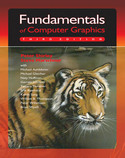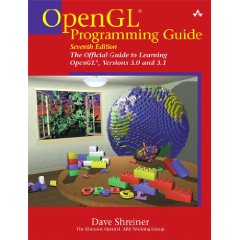main-books
1.@ Required Textbooks
Short Version (what books should I buy?):
There are required readings in two books:
- Fundamentals of Computer Graphics, 3ed by Peter Shirley and Steve Marschner and a bunch of contributors (the main textbook for this class). You should buy or borrow a copy of this book. Note: the new edition has a red cover (as opposed to the green cover of the 2nd edition).
- The OpenGL Programmers Guide (the “red book”) 7th edition. Old versions of this text are available online, and the one critical new chapter from the newest edition will be made available to students online, so its not essential that you buy this book. However, if you plan on working in graphics, you’ll probably want to own a copy.
Note 1: The 3rd edition of Shirley and Marschner really is a very different book than the 2nd edition (which was just Shirley as lead author). In addition to a bunch of new material, the basic chapters (1-9) are re-ordered and revised substantially.
Note: you will also want to have a C++ book. Some suggestions are on the C++ page
Long Version (what are the books and why?)
Unfortunately, there isn’t a textbook that covers the material in this class the way that I want to cover it. Shirley’s book (see below) comes close, when coupled with the OpenGL red book (see below as well). The RTR book (see below) could be a textbook, it covers suprisingly many topics really well. But its a little too focused to be a general textbook.
I provide links to Amazon since they can be cheaper than the UW bookstore - I do not necessarily endorse them.
1.1@ Main Textbook:

Peter Shirley and Steve Marschner. _Fundamentals of Computer Graphics, 3ed_
note: the new 3rd edition is different than the second - it is red (not green).
At Amazon: bookkindle edition (if you have a kindle and get this, I’d love to see it!)
This is a general purpose textbook on graphics. It tries to cover the basics, without getting into the details of any particular system or API. It started out as a focused text on the most important topics, but over time, it has grown to cover a lot of stuff. While its not an ideal text for this class, its the best choice of all the ones I see out there (and I have been looking).
1.2@ Second Textbook

Shreiner, et al. The OpenGL Programmer’s Guide, 7th edition.This is sometimes known as the “red book.”
OpenGL is the graphics library we will use for much of the class. Having a reference book is useful (but there are plenty of references on the web). However: the “OpenGL Programmer’s Guide” turns out to be a great tutorial on a number of topics, so it will provide some required readings in class.
The “Programmer’s Guide” is commonly known as the red book (guess why!). For class, we’ll pretty much stick to material that can be found in old editions (in fact, there are copies of really old versions on the web). However, in the 6th edition, there was a really good chapter on shaders (much better than the 5th edition), so I strongly recommend getting that. The new 7th edition has stuff we don’t care about. However, if you work in graphics beyond this class, you probably will care, so you’ll want the newest possible edition.
OpenGL Programmer’s Guide at Amazon.
There will be some readings from this book, and its an important reference.
I think (but cannot promise) that the ancient edition on the web is sufficient for everything in class except the shaders chapter.
1.3@ Not a Textbook for this class:
Tomas Akenine-Moller and Eric Haines. Real Time Rendering, 3e.
This book is specifically about real-time rendering, and is very useful if you’re interested in interactive stuff like games. It is really well written, and has great discussions of a lot of the basic topics. The new edition just came out (so new its out of stock most places), and is quite encyclopedic. Its an awesome reference book, but a little hard to learn from, so I highly recommend it if you are serious about graphics.
Real Time Rendering at Amazon